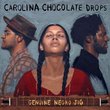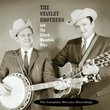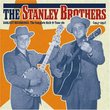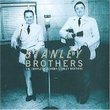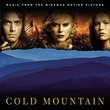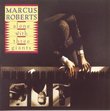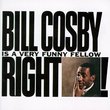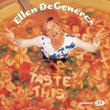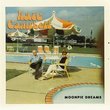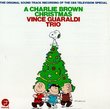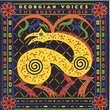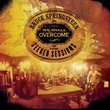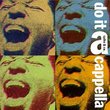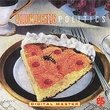| All Artists: Stanley Brothers Title: An Evening Long Ago: Live 1956 Members Wishing: 0 Total Copies: 0 Label: Sony Release Date: 3/23/2004 Album Type: Original recording remastered Genres: Country, Folk, International Music, Pop, Christian & Gospel, Gospel Styles: Bluegrass, Classic Country, Traditional Folk, Contemporary Folk, North America, Appalachian, Southern, Live Recordings, Country & Bluegrass Number of Discs: 1 SwapaCD Credits: 1 UPC: 696998674721 |
Search - Stanley Brothers :: An Evening Long Ago: Live 1956
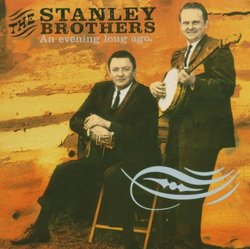 | Stanley Brothers An Evening Long Ago: Live 1956 Genres: Country, Folk, International Music, Pop, Christian & Gospel, Gospel
Quite possibly the bluegrass album of your dreams, this was recorded at the fertile midpoint of a two-decade partnership that ended when Carter Stanley died in 1966. Lead singer-guitarist Carter and tenor harmony singer-ba... more » |
Larger Image |
CD DetailsSynopsis
Amazon.com Quite possibly the bluegrass album of your dreams, this was recorded at the fertile midpoint of a two-decade partnership that ended when Carter Stanley died in 1966. Lead singer-guitarist Carter and tenor harmony singer-banjoist Ralph were always the purest of the defining bluegrass groups, their stark sound and songs coming from some haunting place deep in the mountains. Rather than the machine-gun picking and frenetic vocals of many of their peers, they relied on a meditative, still-waters-run-deep approach in which serenity co-existed with deep sorrow. This set was recorded at a Bristol, Virginia, radio station around midnight, after the Stanleys had completed a full day of radio shows and personal appearances; rather than repeat their usual repertoire, they reached back for personal favorites (the Monroe Brothers' "Drifting Too Far from the Shore") and traditional songs ("John Henry") from their childhoods. In doing so, they embodied, with grace and fire, a way of life already fading even then. --John Morthland Similar CDs
Similarly Requested CDs
|
CD ReviewsIntimate, one-of-a-kind portrait of bluegrass legends hyperbolium | Earth, USA | 04/13/2004 (5 out of 5 stars) "It's a nice surprise when archivists dig up something new on well-known; doubly so when the material expands our view of their careers. This disc, previously only available on vinyl at Ralph Stanley's gigs, provides welcome new details on the roots of one of bluegrass music's greatest acts.In 1956 the Stanley Brothers were at the height of their powers, with a repertoire that had expanded across a series of records for Mercury. This performance, recorded in an off-air Bristol, Virginia radio studio is an intimate recitation of their roots, laid down with no audience beside the engineers, and with no planning beyond a career's worth of practice. The brothers wander easily through their catalog - all first takes, with no set list - testifying to the power of brotherly bonds and countless nights on the road.The brothers' stage and radio performances have been well documented (notably by Copper Creek's out-of-print 11-disc "Stanley Series" and Rebel's "On Radio"), but this private recording is something very different. Without no audience to please, the Stanley's ad-libbed a song list weighted heavily towards their personal favorites - songs not often included in their stage or recording repertoires, and only three of which they'd previously waxed. Their selections reach back to folk standards learned in childhood and formative works by the Delmore and Monroe Brothers.Highlights include tales of family tragedy, "Come All You Tenderhearted" and "The Story of the Lawson Family," both chilling in their knowing details of death and murder, and a stupendous duet of "Orange Blossom Special." The latter, in particular, shows off the brotherly bond that allows their vocals to careen in tandem around the song's mountain curves. Ralph's banjo drives the solo "Shout Little Lulie" (reportedly the first song his mother taught him) and "Little Birdie."This intimate snapshot stakes The Stanley Brothers' claim as among the greatest harmony duos in bluegrass history. Carter Stanley's voice defines the high, lonesome sound of bluegrass, and combined with his brother's tenor harmonies, the two voices stick together like magnets. Carter's introductions provide occasional context, but mostly the brothers focus on each other. Mandolin player Curly Lambert adds additional harmonies, and fiddler Ralph Mayo adds the aching blue notes to this superb volume of mountain soul." Rawboned performance of straight-ahead traditional music J. Ross | Roseburg, OR USA | 04/01/2004 (5 out of 5 stars) "Stanley Brothers fans will really rejoice at the release of "An Evening Long Ago - Live 1956." The session was recorded by Larry Ehrlich at the WCYB radio studios in Bristol, Virginia on March 24, 1956. It was originally released as a private pressing for friends only and sold only at concerts. Musicologists will recall that the inagural broadcast from Bristol of the Clinch Mountain Boys' "Farm and Fun Time" took place only about ten years earlier, on December 26, 1946. The band made about $2.25 apiece that evening, but the postcards, letters and invitations to play rolled in. The station's listeners were ready for the Stanleys' post-war mountain music, and the musicians were ready to oblige, as well as to capitalize on the exposure, publicity and income that the show brought them. They left Bristol a few times for shows in North Carolina, West Virginia, Louisiana, Kentucky, but they'd always return to Bristol. At the time, their career in music had some ups and downs while they were travelling the countryside in their Cadillac. The Brothers were successfully recording for Rich-R-Tone and Columbia. In 1951, despite their success, Carter and Ralph quit the music business and went to work at Ford Motor Co. in Detroit. Soon after, Carter was back in music singing lead with Bill Monroe's Blue Grass Boys. Ralph was in a serious auto accident in Tennessee. Finances were tight. Ralph (and Pee Wee Lambert) built rooms in the old Stanley country store and attended an agricultural instruction course with plans to become farmers. These are the kinds of things that the Stanley Brothers were facing in life when they accompanied Curley Lambert (mandolin), Ralph Mayo (fiddle) and Larry Ehrlich (recording engineer) to the radio studio around midnight to record live around one microphone. Around that time, they were using either Bill Lowe or Doug Morris on bass, but the session unfortunately took place without a bass-player. The set starts with Larry saying, "Let `er roll." As with many live recordings, you get spontaniety, energy, and even a few comments or ambient noises. You can hear a door closing on "Meet Me Tonight," Carter's introduction to the 1928 murder tragedy near Danbury, N.C. for "The Story of the Lawson Family," Ralph whoop it up a bit on "My Long Skinny Lanky Sarah Jane," and a few throats clearing now and then.It's interesting to note that, with a few exceptions, many of these songs are among the first recorded renditions of them for the Stanley Brothers. Little Birdie, Orange Blossom Special, and Tragic Love are some songs that had been recorded prior to March, 1956. For a few others, I am not sure if they were ever recorded by both Carter and Ralph (prior to Carter's untimely death in 1966) unless they appear on other live recordings from the era. A check of Gary Reid's preliminary discography of the Stanley Brothers doesn't indicate early versions of Dream of a Miner's Child, Poor Ellen Smith, Darling Do You Know Who Loves You?, Bound to Ride, My Long Skinny Lanky Sarah Jane, John Henry, and Feast Here Tonight. I would need to also research their live recordings from 1947 to 1966, and it's likely that Copper Creek Records has released some or all of these songs on their multi-album series taken from live radio shows. The twenty tunes offered on this project include many of their famous brother duets and instrumentals, many from their own folkloric family tradition and early recordings of the 1930s and 40s. Carter plays a solid guitar and sings lead. Ralph plays banjo and sings tenor. "Shout Little Lulie" and "Little Birdie" were the first tunes that Ralph's mother, Lucy, had taught him on the banjo. Ralph used to play mandolin on "East Virginia Blues" on the Farm and Fun Time, and because this cut doesn't have banjo, I wonder if that is Ralph picking mandolin. Another curiosity is that Ralph Stanley uses the clawhammer style on "Bound to Ride," a song he typically did during the 60s in standard three-finger style before rearranging it for clawhammer again about 1971. Also, the song credit for "Bound to Ride" should have properly been attributed Arthur Smith. This album's 1956 recording of "John Henry" is done three-finger style, and that's another that Ralph rearranged for clawhammer style in 1973. Presumably, Carter learned "Train 45" from the records of Gilliam Grayson and Henry Whitter. Unlike Grayson's train that started from two different places on two different records (Atlanta or New York), Carter clearly says that his train leaves from Atlanta, Georgia, all aboard. Grayson and Whitter are also attributed as songwriters of this album's opener, "Handsome Molly." While many of these songs would be recorded again in later years on fancier equipment, "An Evening Long Ago" is a rawboned performance of their straight-ahead traditional old-time mountain music and bluegrass. This is a rare opportunity to experience the beauty and power of The Stanley Brothers at one peak in their music career together. It's simply the feeling on this disc that allows us to nostalgically relive a time when they travelled the circuitous, narrow mountain roads between radio stations, churches, barn dances, and tiny schoolhouse auditoriums. (Joe Ross, staff writer, Bluegrass Now)" A sweet, stripped-down, informal recording Joe Sixpack -- Slipcue.com | ...in Middle America | 04/09/2004 (5 out of 5 stars) "Simply sublime. Recorded in an after-hours session at Bristol, VA radio station WCYB, this twenty song set captures bluegrass legends Ralph and Carter Stanley at the peak of their fame, in March, 1956, playing in a relaxed, informal setting that emphasizes the their softer, folkier side. Station engineer Larry Ehrlich asked the brothers to play some of their favorite traditional songs, and while they still wound up performing several of their own original songs, the bulk of the album is material that were a little off the beaten track for the Stanleys, and has a haunting quality that will make you sit up and take notice. Although many of these tunes would become part of their regular repertoire, these versions have a more subdued, old-fashioned feel than in their more polished, popular studio renditions. On shorter instrumental numbers such as "John Henry," the band shows that size isn't everything: in 76 seconds they rip through the melody, with some notably slick banjo playing by Ralph, with dazzling accompaniment throughout; even goofy novelty numbers like "My Long Skinny Lanky Sarah Jane" show the breadth of the band's entertainment repertoire. Mandolinist Curly Lambert and fiddler Ralph Mayo provide some sweet, understated accompaniment... Nice stuff!"
|

 Track Listings (20) - Disc #1
Track Listings (20) - Disc #1